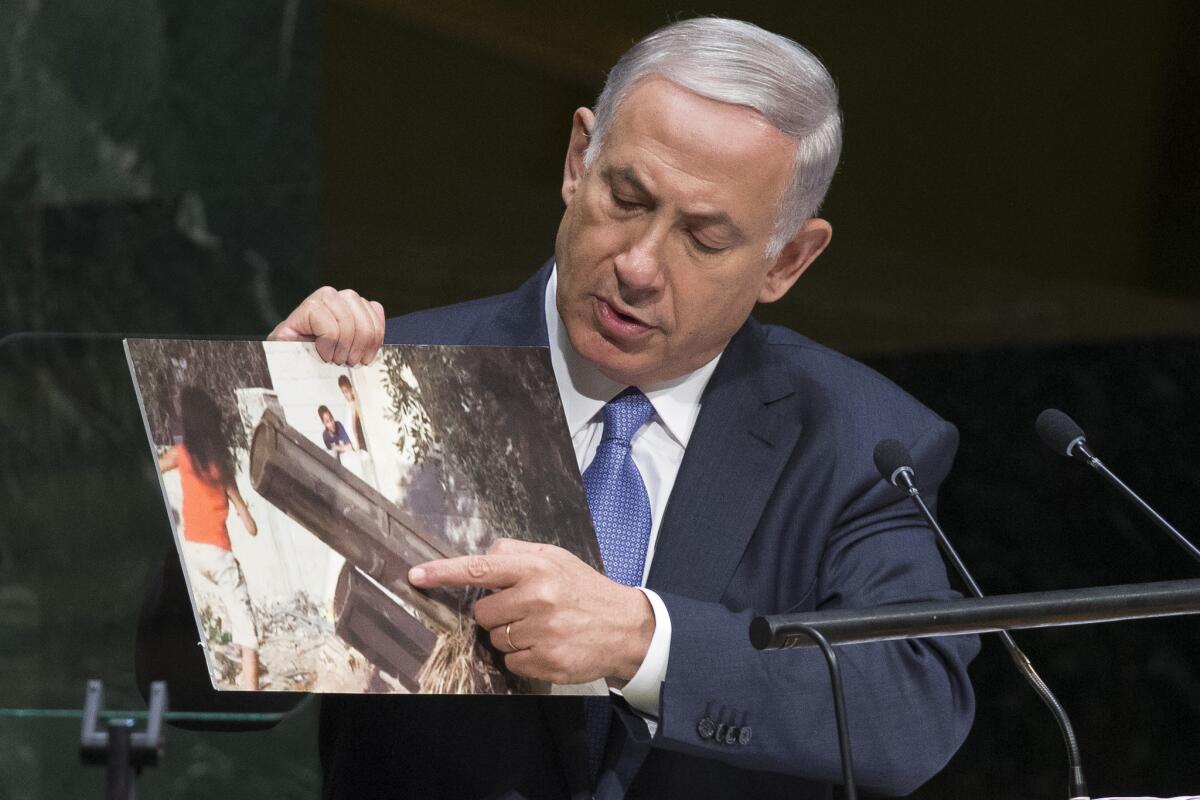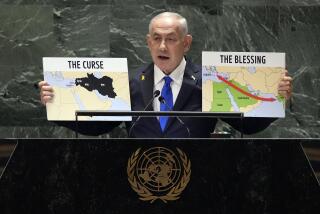Netanyahu calls on Arabs to take first step for peace

- Share via
Reporting from Washington — Israeli Prime Minister Benjamin Netanyahu, in remarks to the United Nations General Assembly, said Monday that Arab nations should start working with Israel if they want to bring about an Israeli-Palestinian peace.
Netanyahu said that while an Israeli-Palestinian peace deal has long been seen as a route to a broader Arab-Israeli rapprochement, it could work the other way around, if Arab countries provide the political and material support needed to settle the Israeli-Palestinian conflict.
“To achieve that peace, we must look not only to Jerusalem and Ramallah, but also to Cairo, to Amman, Abu Dhabi, Riyadh and elsewhere,” Netanyahu said. “I believe peace can be realized with the active involvement of Arab countries.”
Netanyahu’s government has been trying to enlist regional and world powers for help in disarming Hamas, the Palestinian militant group, and establishing safe borders between Israel and the Gaza Strip.
Netanyahu also warned world powers that in their eagerness to stop the Islamic State militant group they shouldn’t forget the threat of Iran, which he described as a much bigger danger.
He said that to defeat Islamic State “and leave Iran on the threshold of nuclear power is to win the battle and lose the war.”
“Iran’s nuclear military capabilities must be fully dismantled,” he said.
Netanyahu said that some criticism of Israel’s policy is no more than anti-Semitism.
When national leaders compare Israel to the Nazis, “This is not a function of Israel’s policies. It’s a function of diseased minds and that disease has a name. It’s called anti-Semitism.”
“It is now spreading in polite society where it masquerades as legitimate criticism of Israel,” he said.
Separately, Deputy Secretary of State William J. Burns acknowledged Monday that negotiations between Iran and six world powers over Iran’s nuclear program are at an especially difficult point.
Appearing at the Washington Institute on Near East Policy, Burns said that this year’s talks are more difficult than last year’s effort to reach an interim nuclear agreement.
“It’s no secret that the negotiations are quite significant right now,” he said. “There are some quite significant gaps right now on the issues that are going to be critical” in completing the deal.
He insisted, however, that it is still possible to reach a deal by the deadline of Nov. 24.
The world powers and Iran are seeking a deal that would lift economic sanctions on Iran in exchange for its taking steps to ensure that it won’t gain bomb-making capability.
Special correspondent Batsheva Sobelman in Jerusalem contributed to this report.
For foreign policy news, follow @richtpau
More to Read
Sign up for Essential California
The most important California stories and recommendations in your inbox every morning.
You may occasionally receive promotional content from the Los Angeles Times.














